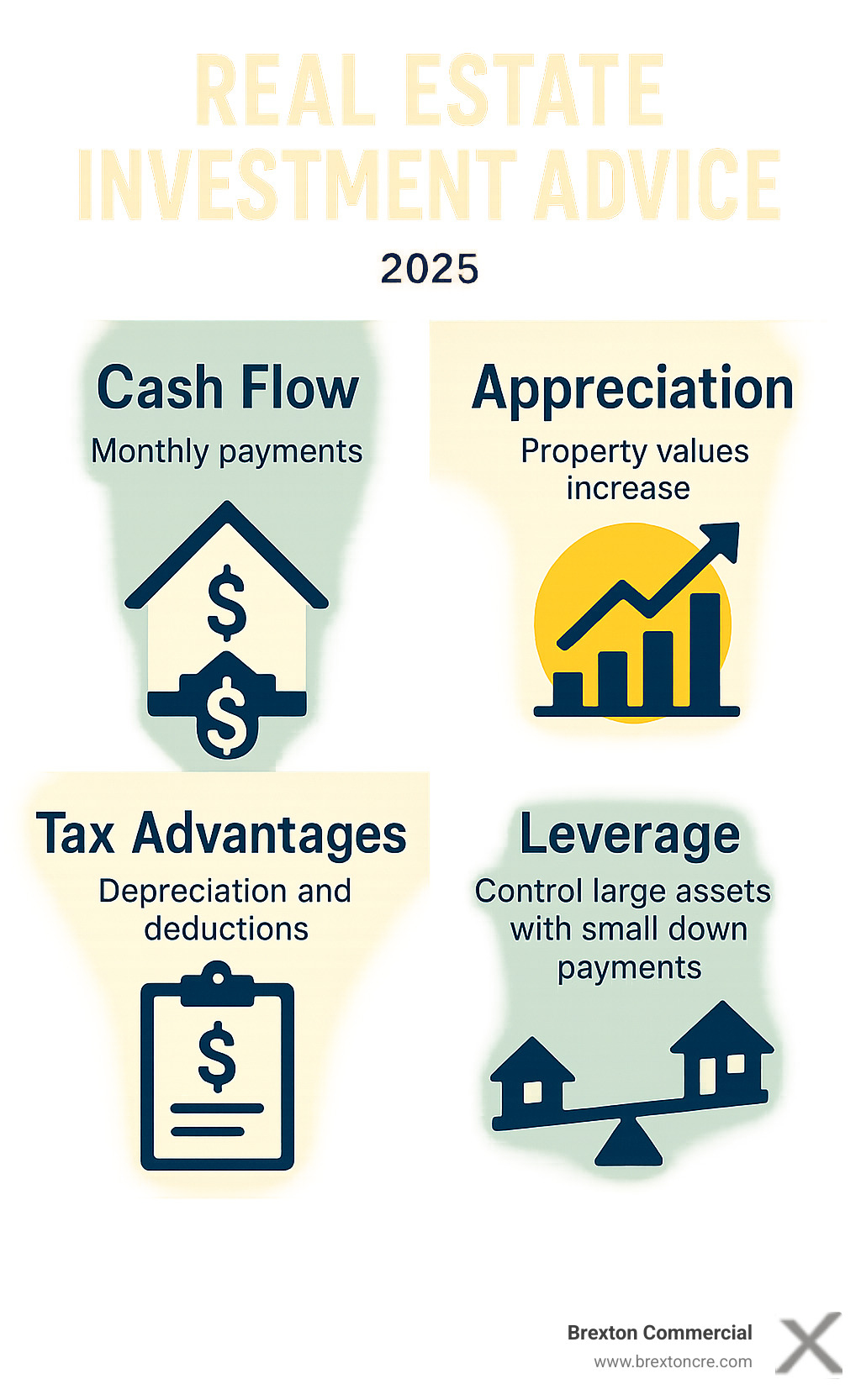Why Real Estate is a Powerful Wealth-Building Tool
Real estate investment advice begins with a simple truth: real estate is the world's largest asset class. For business owners in the Mid-Atlantic region, this represents a significant opportunity to build long-term wealth through strategic property investments.
Quick Real Estate Investment Advice for Beginners:
- Start with Financial Readiness: Aim for a 650+ credit score and save 20-25% for down payments.
- Choose Your Strategy: Decide between buy-and-hold for cash flow, value-add for higher returns, or REITs for passive investing.
- Focus on Location: Research job growth and economic trends in Baltimore, D.C., Virginia, and Pennsylvania.
- Build Your Team: Work with experienced advisors, accountants, attorneys, and property managers.
- Understand the Numbers: Analyze cash flow, appreciation, and tax benefits before investing.
The appeal is clear. Real estate offers three powerful ways to build wealth: cash flow from rental income, property appreciation over time, and significant tax advantages. Unlike stocks, real estate provides tangible assets you can see and control.
Successful real estate investing isn't about getting rich quick. It's about making calculated, long-term decisions backed by solid research and professional guidance. The Mid-Atlantic region offers unique advantages, from Baltimore's revitalization to D.C.'s stable employment and Virginia's tech corridor. However, jumping in without preparation can lead to costly mistakes like underestimating expenses or choosing the wrong strategy.

Basic Real estate investment advice vocab:
Step 1: Laying the Financial Foundation for Your First Investment
Before you start browsing property listings, it's crucial to talk about money. The best real estate investment advice always starts with this truth: your financial foundation determines everything.
Think of your personal finances as the foundation of a house. A shaky foundation leads to cracks, and weak financial preparation leads to investment disasters.

Assessing Your Financial Readiness
Your credit score is your financial report card. Lenders prefer a score of 650 or higher, with 700+ securing better interest rates. Your debt-to-income ratio is also critical; lenders look for a ratio below 43%, which is calculated by dividing your total monthly debt payments by your gross monthly income.
Many beginners focus only on the down payment, which is typically 20-25% for an investment property. However, you must also budget for unexpected costs. A charming Baltimore rowhouse might need a new roof, or a reliable tenant could move out unexpectedly.
Creating a financial cushion of 3-6 months of operating expenses is essential for survival. This fund covers vacancies, surprise repairs, and other emergencies that every landlord eventually faces.
Securing Financing: Your Loan Options
Once your finances are in order, it's time to explore funding. The financing you choose can make or break your deal's profitability.
- Conventional loans are the standard for real estate investing, typically requiring 20-25% down and stricter qualifications. In return, they generally offer better terms.
- FHA loans are great for beginners using a "house hacking" strategy. By purchasing a 2-4 unit property and living in one unit, you can qualify for a loan with as little as 3.5% down.
- Portfolio loans from local banks may offer more flexible terms for unique properties common in older Mid-Atlantic markets, though often at higher interest rates.
Lender requirements go beyond your credit score. They scrutinize your income stability, existing debts, and the property's income potential. It's crucial to shop around, as a community bank in Baltimore might offer better terms for a local property than a national lender would.
Step 2: Choosing Your Strategy & Finding the Right Property
With a solid financial foundation, it's time for the exciting part: creating your investment playbook. A clear strategy should match your goals, timeline, and risk tolerance. Success comes from informed decisions based on market research and thorough analysis.
Beginner-Friendly Investment Strategies: Pros and Cons
Three main strategies offer a good balance of accessibility and potential returns for beginners.
- Buy and Hold: This is a steady, reliable strategy. You purchase a property, rent it out, and hold it for years, collecting monthly rent and benefiting from appreciation. It works well in stable markets like Washington D.C., where consistent tenant demand exists. While it requires significant upfront capital (20-25% down), it provides multiple income streams and tax advantages.
- Value-Add Investments: This approach involves buying undervalued properties, renovating them, and then selling for a profit or refinancing. Baltimore's revitalization areas offer excellent opportunities for this. The potential rewards are substantial, but it requires strong project management skills and reliable contractors. Many investors follow the 70% rule: the purchase price plus renovation costs shouldn't exceed 70% of the property's after-repair value (ARV).
- Real Estate Investment Trusts (REITs): Think of these as mutual funds for real estate. You buy shares in companies that own and operate income-producing properties. REITs offer simplicity and liquidity, allowing you to start with a small investment and diversify instantly. The trade-off is a lack of direct control and fewer tax benefits compared to direct ownership. A real estate investment trust (REIT) is like a mutual fund for real estate.
| Feature | Buy & Hold | Value-Add | REITs |
|---|---|---|---|
| Capital Req. | High | Medium to High | Low |
| Time Commit. | Medium (if self-managing), Low (if managed) | High | Low |
| Risk Level | Medium | High | Low to Medium |
| Liquidity | Low | Medium | High |
The Golden Rule: Location, Location, Location in the Mid-Atlantic
Good real estate investment advice is location-specific. It's about understanding the economic heartbeat of an area. The Mid-Atlantic's economic diversity provides stability. When analyzing locations, look at what drives the local economy, employer trends, and population shifts.
- Baltimore: The city's revitalization efforts, like those in Port Covington, are creating growth. Analyzing neighborhoods in Baltimore requires local expertise.
- Washington D.C.: A stable government and thriving tech sector make D.C. a powerhouse. Understanding the Washington D.C. commercial real estate market is key to success here.
- Virginia: Offers everything from the Northern Virginia tech corridor to emerging markets in Richmond. Proximity to D.C. and a business-friendly environment are major draws.
- Pennsylvania: Philadelphia's historic charm and growing innovation districts, along with a diverse economy, create multiple investment niches.
The secret is to start local. Investing within a few hours' drive allows you to visit properties and develop an intuitive feel for the market.
Check out Baltimore Real Estate Market Trends and More on the DC Commercial Real Estate Market for deeper insights.

Conducting Due Diligence and Selecting a Property
Once you've identified a location, the detective work begins. Start by defining your 'buy box'—a clear set of criteria for your ideal property (neighborhood, price, yield). This keeps you focused and prevents emotional decisions.
Property analysis is about the numbers. For rentals, calculate the gross rental yield and subtract all expenses to ensure positive cash flow. For value-add properties, understanding the after-repair value (ARV) is critical. Research comparable sales, but be conservative.
Professional property inspections are non-negotiable, especially for the region's older properties. A title search is also essential to ensure a clear ownership history. Successful investors approach due diligence like a business transaction and are willing to walk away from deals that don't meet their criteria.
Step 3: Understanding the Numbers: Real Estate Investment Advice on Profits and Taxes
Now we dive into the heart of real estate investment advice: understanding how you make money and how taxes impact profits. This is about learning the financial language of real estate to maximize net returns and protect yourself from risk.
The Pros and Cons of Investing in Real Estate
Real estate has built wealth for centuries, but it has its challenges.
The advantages are compelling.
- Cash flow is the monthly income from tenants after all expenses are paid, creating a steady stream of passive income.
- Appreciation is the long-term increase in property value. Real estate in the Mid-Atlantic, near job centers like Washington D.C., often sees steady appreciation.
- Leverage is real estate's superpower. You can control a large asset with a small down payment, amplifying your returns.
- Portfolio diversification offers stability. The real estate market generally features low volatility compared to the wild swings of stocks.
But real estate isn't without its challenges.
- Illiquidity means you can't sell quickly. Selling a property takes weeks or months.
- Time and money commitment can be significant. Landlord responsibilities, from tenant screening to repairs, require effort.
- Market risk is real. Economic downturns or rising interest rates can impact property values and rental demand.
The key is understanding these trade-offs before you invest.
Maximizing Returns with Tax Benefits
This is where real estate investment advice gets exciting. The IRS encourages real estate investment through various tax advantages that can dramatically boost returns.
Depreciation is a powerful benefit. The IRS allows you to deduct a portion of your property's value each year to reflect "wear and tear." This is a paper loss that reduces your taxable income, even if the property is appreciating.
Deductions for mortgage interest, property taxes, insurance, maintenance, and management fees can significantly lower your tax burden. Meticulous record-keeping is crucial to capture every deductible expense.
Capital gains tax is lower for properties held for more than a year (long-term gains) compared to those held for less (short-term gains), encouraging a buy-and-hold strategy.
A 1031 exchange is a powerful tool for serious investors. It allows you to defer capital gains taxes when you sell an investment property, provided you reinvest the proceeds into a similar property within a specific timeframe. This lets you grow your portfolio without the immediate tax hit, compounding your wealth faster.

Step 4: Managing Your Investment and Building Your Team for Long-Term Success
Congratulations on your purchase! But here's a reality check: buying the property was just the beginning. The real work and profits come from effective management.
Effective Property Management: DIY or Hire a Pro?
One of your biggest decisions is whether to manage the property yourself or hire a professional.
The DIY Route gives you complete control and saves the 8-12% management fee, boosting your cash flow. This works best if you're local, have flexible time, and enjoy the hands-on work. However, you'll be responsible for everything from late-night emergency calls to tenant screening. Modern landlord software can help streamline these tasks by handling rent collection, screening, and maintenance requests.
Hiring a Professional becomes attractive as your portfolio grows. A good property manager handles marketing, screening, rent collection, and repairs. This is especially valuable in the Mid-Atlantic, where landlord-tenant laws vary significantly between Baltimore, D.C., Virginia, and Pennsylvania. The fee buys back your time and provides professional expertise that can often increase your net income by reducing vacancies and securing better tenants. For commercial properties, professional management is almost essential. Professional Commercial Property Management in DC can provide the expertise needed to maximize returns.
Essential Real Estate Investment Advice: Avoid These Common Beginner Mistakes
Learning to avoid common pitfalls can save you significant money and heartache.
- Miscalculating expenses: Don't just focus on the mortgage. Factor in taxes, insurance, maintenance, and vacancy.
- Rushing due diligence: Take time to inspect properties and research markets. There will always be another deal.
- Emotional investing: Make decisions based on numbers and strategy, not feelings. Stick to your criteria.
- Co-mingling finances: Keep business and personal finances separate to track performance and simplify taxes.
- Underestimating repairs: Get multiple contractor bids and add a 10-20% buffer for unexpected issues, especially in older Mid-Atlantic properties.
Ignoring local regulations: Landlord-tenant laws vary dramatically. Stay informed to avoid legal trouble.
Read about 6 Things I Learned the Hard Way When I Started Investing in Real Estate
Why You Need a Professional Team
Here's some of the best real estate investment advice you'll ever get: you cannot do this alone. Building a strong professional team is an investment that pays dividends.
Your team should include:
- A real estate advisor or broker for market intelligence and access to deals.
- A real estate attorney to protect you from legal pitfalls.
- An accountant or CPA to maximize returns through tax planning.
- A reliable lender to help you secure the best financing.
- Trusted contractors to handle repairs efficiently.
- A property manager (if you choose) to handle day-to-day operations.
These professionals help you identify opportunities, mitigate risks, and build a more profitable portfolio.
Frequently Asked Questions about Real Estate Investing
How much money do I need to start investing in real estate?
The answer varies depending on your strategy. You don't need to be a millionaire to begin.
For the lowest barrier to entry, you can invest in REITs for under $100. This gives you exposure to the market without direct ownership.
For direct ownership, house hacking is a brilliant strategy. You buy a multi-unit property (2-4 units), live in one, and rent out the others. Because it's your residence, you can qualify for loans like an FHA loan with a down payment as low as 3.5%. The rental income can cover most or all of your mortgage.
For traditional rental properties, lenders typically require a 20-25% down payment. On a $300,000 property, that's $60,000-$75,000, plus closing costs. Building this capital is achievable with disciplined saving and budgeting.
Is real estate a good investment right now in the Mid-Atlantic?
The Mid-Atlantic region presents both opportunities and considerations for smart investors. Higher interest rates have adjusted the market, creating opportunities for those with capital as competition has lessened.
- Maryland: Baltimore is experiencing a renaissance, creating exciting opportunities, especially with its proximity to D.C.
- Washington D.C.: The area's economic stability, driven by government and private sector employment, creates consistent demand and market resilience.
- Virginia: The Northern Virginia tech corridor and the ripple effects of major corporate investments continue to drive demand for all property types.
- Pennsylvania: Philadelphia's relative affordability and growing innovation hubs make it a compelling investment story.
Real estate is incredibly local, so understanding economic indicators like job growth and population trends in specific neighborhoods is crucial. The fundamental drivers in the Mid-Atlantic remain strong, making it an attractive region for long-term investment.
Can I invest in commercial real estate as a beginner?
Absolutely, though it requires more capital and knowledge than residential. The key is to work with the right team.
The differences from residential are significant. Commercial properties are valued based on their income potential, leases are longer (5-10 years), and financing focuses more on the property's performance. Capital needs are higher, with down payments often at 25-30%.
There are several entry strategies for beginners. REITs focused on commercial properties offer a low-capital entry point. Another strategy is to work with local experts, like our team at Brexton Commercial. We can help identify smaller, manageable properties and connect you with lenders who understand the commercial market.
Commercial property types in our region offer diverse opportunities, including:
- Office
- Retail
- Industrial
- Multifamily (5+ units)
Conclusion: Take the Next Step on Your Investment Journey
We've covered the essential steps, from financial preparation to building your professional team. Each piece of real estate investment advice builds on the last, creating a roadmap to transform your financial future.
What truly matters is this: financial preparation provides the capacity to invest, strategic planning aligns the investment with your goals, and due diligence protects you from costly mistakes. Maintaining a long-term perspective is key to riding out market fluctuations and building real wealth.
The Mid-Atlantic region offers a rich mix of possibilities, from Baltimore's revitalization to Virginia's tech boom. But knowing about these opportunities and capitalizing on them are two different things. The nuances of each market and local regulations can make or break your success.
Professional guidance is essential. Having experts who understand the Mid-Atlantic markets can save you from expensive mistakes and help you spot opportunities you might otherwise miss.
The path to success in real estate requires knowledge, patience, and a strong team. To steer the complexities of the market, especially in the Mid-Atlantic region, expert guidance is invaluable. Explore our expert advisory services to start building your real estate portfolio today.
Your real estate investment journey starts with a single step. Make sure it's in the right direction.





